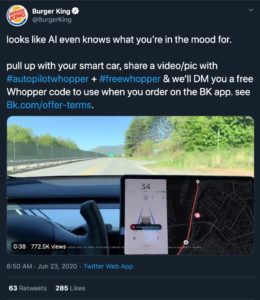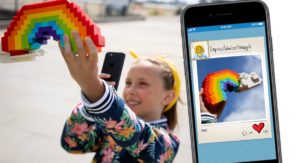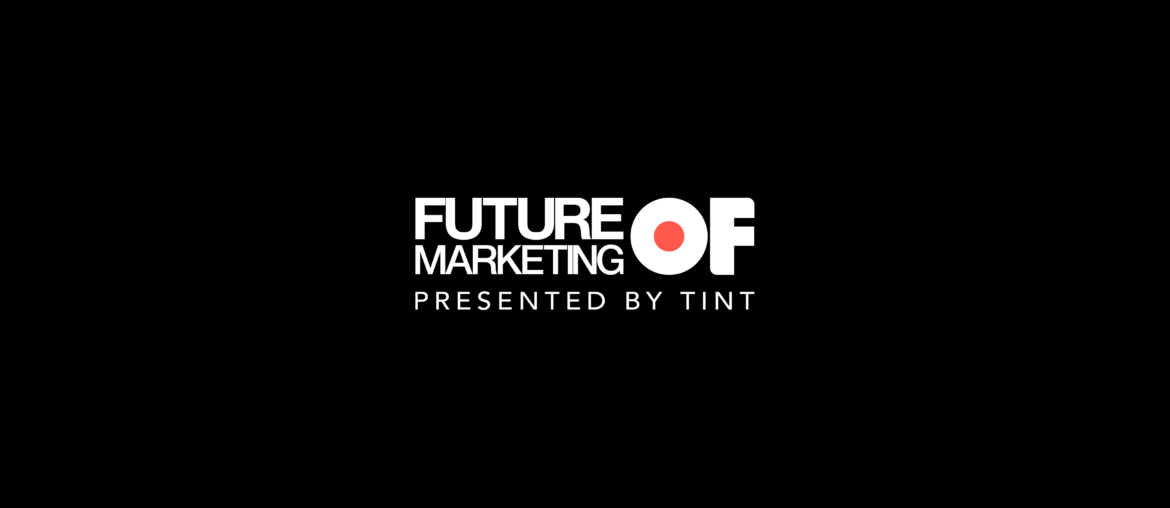This content originally appeared June 25, 2020 as part of the Future of Marketing weekly email series. Subscribe here.
As many people remain in their homes, brands continue to adapt their marketing strategies to rely more on user sourced content for ads and new technologies to support virtual conferences and events.
Now is the time to adapt and experiment to connect with your audience.
User-generated advertising
Can your car get you a free Whopper? Burger King (BK) released an ad based on Tesla’s autopilot, cleverly stating “Smart Cars are Smart Enough to Stop for a Whopper,” as some cars will allegedly confuse the BK sign with a stop sign. Burger King is urging consumers to create content by offering a free Whopper to anyone who shares a video or picture on Twitter of their smart car outside a Burger King restaurant, using the hashtags #autopilotwhopper and #freewhopper.

For Father’s Day, Dove released a video ad, which highlights user-generated videos of dads spending time with their kids in a variety of activities. Dove is supporting families with essential donations and home-parenting resources with their ad campaign.
Since late May, over 340 million tweets have been shared about Black Lives Matter. Twitter collected tweets and featured them on billboards in strategically selected cities across the United States – specifically to bring awareness to Juneteenth, a date commemorating the ending of slavery in the US.
Conferences & events
Are virtual events here to stay? Hootsuite CEO Ryan Holmes certainly thinks so. Setting out to answer the question of how to make virtual conferences better, he polled over 2 million twitter followers, sharing his findings in this article. The big takeaways? Good content, human interaction, connection, and engagement are more critical than ever.

Xiaoyin Qu and Xuan Jiang, former employees of Facebook and co-founders of digital event startup Run The World reiterate the importance of audience engagement and connection in findings based on their own experience with virtual events.
Brands and event organizers everywhere have been forced to rethink and rework plans to adapt to a virtual world. Kimberly Hardcastle-Geddes, chief marketing strategist at mdg, shares eight of the most important lessons they’ve learned so far in developing, marketing, and launching virtual events for their clients.
Brands pulling Facebook ads
A growing number of companies, including REI, The North Face, Patagonia, Ben & Jerry’s, Eddie Bauer, and Magnolia Pictures have joined a planned boycott of Facebook Ads. A coalition of civil rights groups has called on Facebook advertisers to stop ad spends during July to support the Stop Hate For Profit campaign and “show they will not support a company that puts profit over safety.”
Carolyn Everson, vice president of Facebook’s global business group, said in a statement emailed to Forbes that “our conversations with marketers and civil rights organizations are about how, together, we can be a force for good.”
In other news for the platform, Microsoft announced that it is closing down Mixer and beginning to transition users over to Facebook Gaming effective immediately. Mixer was Microsoft’s attempt to compete with gamer live streaming platforms Twitch and Facebook Gaming.
#BrandCrush: Lego
Chances are that you have positive memories tied to Lego.
In their just-released 2020 report, Talkwalker placed Lego in the top spot for the world’s most loved brands. Todd Grossman, Talkwalker CEO for the Americas explains, “Lego placed tops because out of the 11 brand-love traits we measured, they hit theirs extremely well. Globally, the creative act of playing with bricks is universal and needs little translation. The brand has shifted to the social age marvelously with engaging content across all platforms, using influencers and user-generated content and TV shows amongst other content delivery vehicles.”

Julia Goldin, CMO of Lego, credits the brand’s success to a renewed focus on four principles: promoting and defending every child’s right to play, innovating by embracing change, collaborating with people who love the brand, and supporting children.
Love for a brand can instill a sense of loyalty and advocacy, but it’s not easy to build. Brand love requires an emotional connection. From products for a large variety of interests to the LEGO® Life online community, Lego continues to fascinate, engage, and connect with a global audience.
“What I think is really interesting and unique about Lego is the purposefulness in everyone,” Goldin said. “Whether you go to a factory or into a Lego store or into our offices, you can stop anybody and ask them what’s our mission, what’s our purpose? And you’ll hear the same words that you heard from me.”
